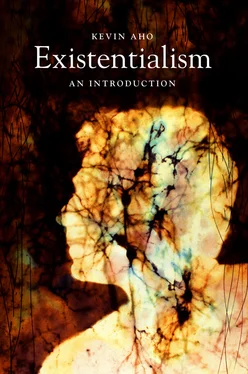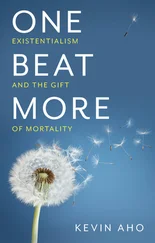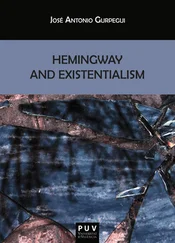But we see now that freedom from rationality does not mean that the actions of the existentialist are empty of moral content. They may not offer prescriptions that tell us how we ‘ought’ to act, but the existentialists do tell us something about what an authentic or choice-worthy way of life is. We are inauthentic when we deceive ourselves about who we are, deny our freedom, and refuse to take responsibility for our actions. We are authentic when we affirm our freedom and accept the fact that our actions have consequences and always involve others. In good faith, we affirm that we are not anything because we are always in the process of choosing, of making and remaking ourselves as we take stands on our situation. This means that whatever meanings or values I commit myself to I am always aware that they are not binding on me a priori , that I give things meaning only through my actions in the world, and I am always free to choose other meanings as my situation changes. But defending existentialism in this way is still problematic because it looks like pure ‘subjectivism,’ where it is up to the individual alone to invest the world with meaning, and whatever choice I make is acceptable insofar as I take responsibility for it. This raises the question of whether or not existentialists can identify some set of shared values that can place moral demands on us.
Subjectivism or historicism
Existentialists reject the possibility of moral absolutes because this puts universal principles above the concrete needs of the individual. In committing to these principles I am ‘disburdened’ of my primary responsibility, which is to be true to myself. This is why the acknowledgment of God's death is so distressing for existentialists; it reveals the extent to which I am totally abandoned and forlorn, that there is nothing binding that tells me to choose one way of life over another. Without God, our moral evaluations are completely ungrounded. There is no course of action that is right or wrong because all we have to go on is our own subjective commitments. This creates a bleak picture of morality, where it is up to the solitary subject alone to choose his or her own life without appeal to a background of meanings or values that can put evaluative limits or constraints on us. Existentialists, as Iris Murdoch writes, “no longer see man against a background of values, of realities, which transcend him. We picture man as a brave naked will” (1983, 46; cited in Vogel 1994, 41). This view is especially problematic for figures like Sartre who identify subjectivity as the starting point of existentialism and radical freedom as its supreme value. But for figures like Heidegger and Merleau-Ponty, who posit the centrality of being-in-the-world, the charge of subjectivism doesn't hold.
As we saw in chapter 5, Heidegger and Merleau-Ponty reject the conflation of existentialism with subjectivism because they understand that our choices and actions are already bound up in a world of shared meanings. On their view, I cannot be the sole source and measure of value because I am already thrown into a situation that is value-laden, thus I am already “ condemned to meaning ” (Merleau-Ponty 1962, xix). The most definitive expression of this critique is found in Heidegger's ‘Letter on Humanism.’ Here, Heidegger dismisses Sartre for labeling him an existentialist because such a view suggests that he supports “subjectivism” (1977a, 208–210). For Heidegger, meanings never emerge ex nihilo from the willful intentions of the subject because we are already “claimed” or “appropriated” by Being (199), where Being is understood as the disclosive movement of history. This means that there is an authority beyond the subject that guides our choices and actions, namely our historical situation, or what Heidegger in Being and Time calls ‘historicality’ ( Geschichtlichkeit ). On this account, we are not radically free to invest things with value “because historicality is a determining characteristic” of our existence (1962, 42). Any choice that we make as individuals is guided and mediated by our historical context. This is why Heidegger says “Dasein ‘is’ its past in the way of its own Being” (41).
Our predicament, then, is not one of subjectivism, because history invariably places moral demands on us. Thus, a person's acts can still be deemed immoral or praiseworthy insofar as they conflict or correspond with the evaluative measures of his or her community. Of course, this is not to suggest there are moral absolutes that exist independently of human projects. But it does mean that the individual is not a sovereign subject or ‘uncontested author’ of his or her actions, because history has already opened up a space of publicly interpreted values that tell me what I ‘ought’ to do. To be sure, I am still free and responsible in the sense that I have to choose which of these values I am going to commit my life to. But I am not a “free-floating ‘I’ ” (298) whose decisions emerge ex nihilo . Heidegger's account of being-in-the-world decenters the subject, making it clear that my decisions are always bound up in a wider historical framework, where I am invariably appropriating and being appropriated by the values of my historical community. But this view raises its own problems when it comes to ethics.
If moral demands are determined by the historical situation I am thrown into, then they are never fixed and stable. ‘Pride’ and ‘magnificence,’ for example, are honorable traits in Aristotle's ethics but are dishonorable in a Christian morality that emphasizes ‘self-effacement’ and ‘humility.’ And in the West today, it is not Protestant modesty in the face of God but ‘confidence’ and ‘personal magnetism’ that are praised as keys to success in a capitalist economy. All these values are part of our shared history and shape our sense of what is praiseworthy. But there is no way to determine which moral framework we should commit to. It appears that the issue of ‘anything goes’ persists; however, it is no longer rooted in the contingent decisions of the subject but in the contingent movement of history that has already claimed us. As Lawrence Vogel contends, Heidegger appears to have replaced the arbitrariness of ‘subjectivism’ with the arbitrariness of ‘historicism’ (1994, 54). Moreover, if we are embedded beings and there is no way to stand outside of the prejudices of our historical situation, this makes it difficult to subject our own values to moral scrutiny. According to Heidegger, my historical community is “the sole authority a free existing [individual] can have” (1962, 443), but what if my community values an ideology of racism or violence against minorities? How can I take a moral stand on these values if they already shape my self-understanding?
This criticism is especially pointed given Heidegger's own commitment to Nazism and his infamous inaugural address as rector of Freiburg University in 1933. Here, Heidegger speaks of being “truly and collectively rooted” (2009, 109) to a common German heritage, of protecting the “blood and soil” (112) of the German people, and of being “prepared for mutual struggle” ( Kampf ) (115) in the face of cultural threats. Heidegger's rhetoric opens up a hornet's nest of moral questions. If I am irrevocably bound to the values of my history, then how should I regard those who are outside it? Do I have an obligation to treat others as my moral equals even though they do not adhere to my community's values? If there is no ahistorical standpoint that I can take, can I ever judge whether or not my values are any better or worse than others? Heidegger himself was ‘thrown’ into a tradition of deeply rooted racism and antisemitism. But does this entanglement suggest that he is incapable of denouncing it? Other Germans took a critical stand in the face of Nazism; what historical currents made it possible for them (see Vogel 1994, 66–68)?
Читать дальше












